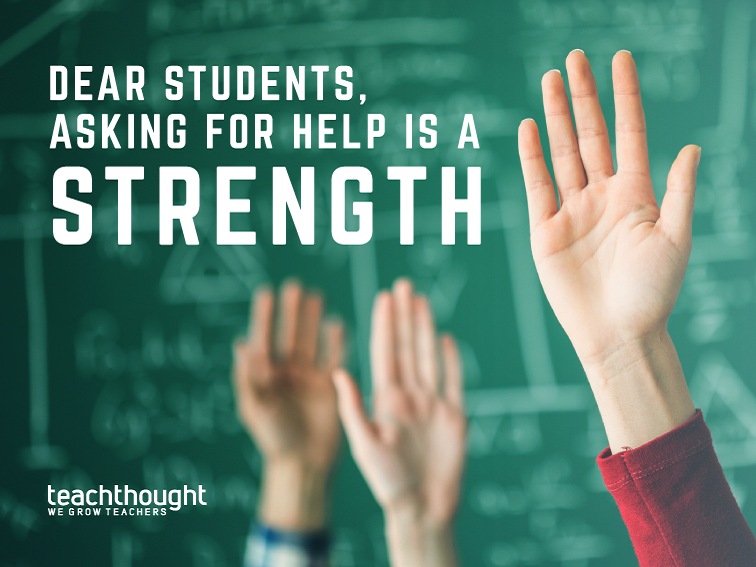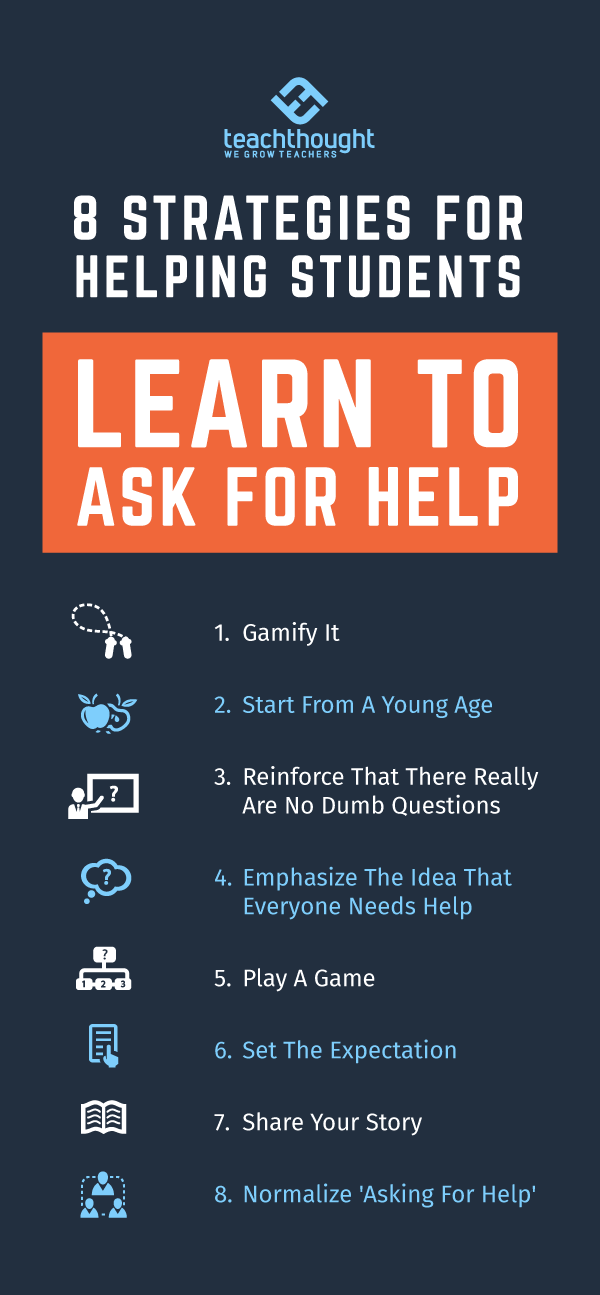8 Strategies For Helping Students Learn To Ask For Help
Help students understand that ‘help’ is the norm in the creative, scientific, and professional world. Asking for help is OK and necessary.

How To Help Students Ask For Help
contributed by Penny Kostaras
I am a K-12 learning coach. My approach is comprehensive – executive functioning, time management, and academic content.
A trend I’ve noticed over my career is a winter influx of bewildered freshman, and I am always sorry that we hadn’t met in the summer prior, or even earlier in middle school to help create a roadmap for success.
The major roadblock I’ve noted for these students is the fear of asking for help. To acquire this skill, students first need exposure to a growth mindset vs a fixed mindset. Students must believe that they can learn more and become smarter through hard work and perseverance and abandon the idea that they are naturally good at _____ or bad at _____.
Dear Students, Asking For Help Is A Strength
Becoming a lifelong learner takes time, effort, and help from others. We can always improve. Asking for help and using one’s resources to solve problems is a strength, not a weakness. Developmentally, middle and early high school students are ripe for learning that self-advocacy is essential to future success.
Middle schoolers have a harder time asking for help because they are still transitioning from the cut and dry thinking of elementary school. Add to that the self-consciousness and insecurity that puberty brings, and no one dares to ask for help for fear of being ‘found out’ or ‘exposed.’ The thought of something being ‘wrong’ with them is devastating. Students entering high school bring with them their old patterns from elementary and middle school which don’t serve them anymore.
Being embarrassed to ask questions and stuck in a fixed mindset hinders their growth. From here on out, they’ll need to ask for help and be open to receiving it in order to be successful. Here are some ideas to promote the acquisition of these skills in the classroom.
8 Strategies For Helping Students Learn To Ask For Help
1. Encourage Students To Ask for Help
Reward students who ask questions and come to see you – whether it’s a points system, gold star, or praise. Create a log where you tally how many students asked questions or came to see you for extra help and have a competition between classes to make it fun.
2. Start From A Young Age
Convey that asking questions is a strength, not a weakness. No one accomplishes anything great on their own. Collaboration bolsters creative thinking and innovation. Encourage students to see asking questions as their new superpower where they gain insight and have extra time with the teacher.
3. There Are No Dumb Questions
Restate this tired phrase in a more positive way: “Questions are welcome, so please ask them. If you have a question, I guarantee someone else has the same one, so you’ll be doing the class a favor by allowing me the chance to clarify for everyone.”
4. Communicate The Idea That Everyone Needs Help
Consider inviting older members of the local community to come to visit and reveal ways that asking for help has benefitted them. Revealing to younger students that getting help is the norm in the creative, scientific, and professional world makes them aware that receiving help is universal and okay. Once in the know, students can let down their guard and be open to receiving help earlier so that they can thrive.
5. Play A Game
Establish your classroom as a place that fosters a growth mindset. Have students get to know each other by asking them to write on a piece of paper two things they are good at and two challenges they typically struggle with regarding the subject you teach.
In small groups, share strengths and challenges. For each share, the group comes together to offer help to each person and brainstorm how they can offer the individual assistance when they need it: “You can count on me (us) when you need help with __________.” This support structure will inspire community and empathy where students will simultaneously want to help and accept help.
Further, you can gamify it using gamification. Done well, gamification works. Start by offering points or rewards or playful barriers to encourage students to ask for help when they need it–and for knowing the difference between when they need help and when they don’t.
6. Set The Expectation / Map Out The Road Ahead
Set individual and group goals that highlight progress overachievement. Show them how much they’ll learn and that an uphill climb is to be expected. From the start, this normalizes work ethic and stretched thinking in the classroom. Remind them that they will all need to play a role in supporting each other when they feel challenged.
This can demystify the idea that some students will naturally breeze through the class while others will struggle alone in silence. Keep checking in throughout the year to promote teamwork and remind them of the goals they set.
7. Share Your Story
Share with your students what you were good at and what you struggled with when you were their age. It’s important to remember what it was like to be the age of your students. What were your strengths and weaknesses in the subject matter that you teach or in other subjects? How did you overcome those obstacles? What embarrassed you?
Looking back now, what’s funny about it? What would you have done differently? Give them a glimpse into your past and they will see you in a new light, not as an untouchable authority, but as a relatable human who has grown and changed throughout the years.
8. Normalize ‘Asking For Help’
By normalizing asking for help, teachers can encourage a growth mindset in students – particularly those who are experiencing a big transition – elementary to middle, or middle to high school. Discarding preconceived ideas about their abilities will empower them to learn more about themselves and what they are capable of.
Through various strategies that promote sharing, being a team-player, vulnerability, mentorship, and sustained effort over time, students will be inspired to abandon self-sabotaging habits and instead embrace self-advocacy. They will now have a chance to see school as an environment that supports the idea that asking for help is a strength.
When students feel safe to take risks, real change can take place. With proper guidance, they will learn to hone their communication skills and leverage their resources with confidence. A growth mindset allows students to appreciate themselves as work-in-progress as they make their personal transformations throughout high school and beyond.

Penny Kostaras has been a trusted academic coach and educator for 13 years and is an expert at taking students from struggling to confident and successful. Penny is the founder of Wise Student, a program offering effective strategies to help students improve time management, organization, and study skills.
